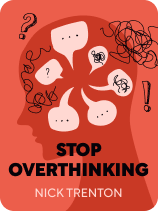

This article is an excerpt from the Shortform book guide to "Stop Overthinking" by Nick Trenton. Shortform has the world's best summaries and analyses of books you should be reading.
Like this article? Sign up for a free trial here.
What is Nick Trenton’s book Stop Overthinking about? What are the main takeaways of the book?
In Stop Overthinking, Nick Trenton discusses what overthinking is and how it’s connected to stress and anxiety. He also explores ways you can manage stress before, during, and after it happens with various research-based techniques.
Read below for a brief Stop Overthinking book overview.
Stop Overthinking by Nick Trenton
Have you ever spent a long time worrying about a problem only to end up feeling stressed and no closer to a solution? In Stop Overthinking, book author Nick Trenton explains that you were probably overthinking the problem: reflecting on it so much that it made you feel bad. Trenton argues that you can disrupt overthinking by adopting stress management skills and replacing your negative thought habits with a positive mental framework. He offers a variety of stress-busting techniques that will help you stay grounded in the present moment and live a productive life driven by action and control rather than endless worrying.
Nick Trenton has a Master’s degree in Behavioral Psychology and specializes in emotional well-being. Stop Overthinking is the first book of his series “The Path to Calm,” which includes other books such as Transform Your Self-Talk and Calm Your Emotions.
What Is Overthinking?
According to Trenton, overthinking is what happens when you think about something so much that it becomes harmful to your health. For example, you just decided between two apartments and signed a lease. Right after, you start wondering whether you made the right choice and spend so much time thinking about it that you feel stressed and anxious all week.
You might think that your thoughts are helpful—that you’re working to solve the issue—but Trenton says that’s rarely the case. When you think about the same thing over and over again, your thoughts cease to add value or provide any solutions to the problem—they only create stress. In fact, whatever problem you’re grappling with usually isn’t the true cause of the anxiety you’re feeling. Rather, it’s your overthinking habit that creates anxiety.
For example, in a job interview, you might have responded to a question in a way you didn’t intend to and then spent hours worrying about that moment. In this case, your worry doesn’t change how you responded to the question. What’s more, your response to the interview question may not have even been problematic: It’s just your swirling thoughts and worries about the response that create a problem and give you anxiety.
Stop Overthinking By Practicing Better Stress Management
Trenton outlines two approaches to manage overthinking: coping more effectively with stress in your daily life and overhauling your mindset to become more resilient to overthinking in the long term. We’ll first look at dealing with stress.
You can manage your tendency to overthink by developing healthier approaches to stress. While you can’t alter your genetics or your environment, you can change how you respond to challenging situations. Trenton offers various strategies to keep your anxiety in check before, during, and after you encounter something stressful.
Before: Manage Your Time to Prevent Stress
Trenton explains that uncertainty can make you feel anxious. When you don’t have a plan for how to complete your daily or weekly tasks, you’re bound to feel higher levels of stress. He suggests you reduce your stress by identifying your top priorities, setting SMART goals, and being deliberate about how you spend your time.
During: Empower Yourself to Handle Stress
Although good time management habits can help prevent stress in your life, you won’t be able to avoid it entirely. When stress does happen, you can take a constructive approach to it and calm yourself through grounding practices.
After: Reflect on Your Thoughts and Feelings to Cope With Stress
Trenton also advises that after a stressful event, you can prepare yourself to better manage future stress by acknowledging and reflecting upon your stressful experiences. Ignoring your stress won’t make it go away. However, if you instead work through it constructively, you’ll gain more awareness about your emotions and what triggers your anxiety so that you can better approach similar situations in the future.
Trenton’s recommendations for reflecting on stress draw from the practice of cognitive behavioral therapy (CBT). This is a form of psychological treatment based on the theory that changing your thoughts can improve how you see the world and yourself. To reflect upon your thoughts and cope with stress, Trenton recommends you journal about your anxious thoughts and explore your feelings about it with curiosity.
Conquer Overthinking With a New Mindset
Now that you’ve learned strategies to effectively cope with stress, let’s discuss how you can conquer your habit of overthinking in the long term by transforming your negative thought patterns into a positive and resilient mindset.
Trenton explains that, in many cases, your overthinking habit is perpetuated by negative thought patterns. These are unsupportive ways of thinking that hold you back rather than strengthen and empower you. Positive beliefs, on the other hand, encourage you to advocate for yourself in spite of your flaws and motivate you to move past obstacles. To manage your tendency to overthink in the long term, you must identify your negative thoughts, challenge them, and replace them with positive beliefs.
Step 1: Identify Your Triggers and Negative Thinking Habits
The first step to adopting a positive mindset is to identify what triggers you to overthink. This could include anything from other people, your environment, or a specific word someone said. For example, you might spiral into doubt whenever someone says “never mind” after you ask them to repeat something.
In addition to specific triggers, you should also identify broader cognitive distortions, which are inaccurate and negative beliefs you might have about yourself and the world. These often drive anxiety and overthinking. For example, you might have a habit of taking everything personally, such as assuming you’ve done something wrong if your friend forgets to text you back.
To identify your triggers and cognitive distortions, Trenton suggests making a table with columns where you describe the stressful situation, how you behaved, and how you felt. For example, you might write that you had texted a friend about something you’re proud of and they never responded. Then, describe your behavior as a result of the situation: You might have neglected your chores and checked your phone every few minutes. Lastly, reflect on your feelings: Perhaps you felt anxious or unwanted as a friend.
Step 2: Challenge Your Negative Thinking Habits
To challenge your negative thought patterns, reconsider the moment through a positive lens and gather evidence to support or disprove your belief. Ask yourself whether there’s any proof for your interpretation of the situation, then write down alternative possibilities in another column of your table. To continue the above example, you might record that you later learned your friend was studying for an exam when you texted them and that you have no evidence that they’re unhappy with you.
Trenton also suggests you challenge negative thought habits by experimenting with doing the opposite of what you’re feeling. While it’s important to validate your feelings, you shouldn’t let them take control of your thoughts and actions. For example, if your anxiety makes you reluctant to go to lunch with your colleagues, try to go through with it. This way, you might find evidence that they enjoy your company, which challenges your anxiety-driven beliefs.
Step 3: Develop Positive Beliefs
Lastly, replace your inaccurate, negative beliefs with positive ones to become more resilient to stress and curb your overthinking. By reframing how you view yourself and the world, positive beliefs strengthen your sense of control and improve your ability to manage stressful challenges productively and effectively.
Trenton suggests you focus on three things to develop a positive mindset:
1) Be in the present moment: Focusing on the present promotes a positive worldview because it allows you to find solutions to your problems without stressing about concerns you have no control over. Instead of ruminating on periods of time you have no control over (the past and the future), you direct your attention to the resources you have now.
2) Let go of what you can’t control: Anxiety and overthinking happen when you fixate on things outside of your control. Trenton suggests you focus on what you do have control over. For example, once you’ve signed a lease for an apartment, rather than worry that you’ve chosen the wrong one, focus on ways to increase your happiness with the one you decided on. Research nearby restaurants or parks and make a plan for a smooth moving experience.
3) Identify your needs: Rather than worrying about and optimizing every little thing in your life, concentrate on meeting your needs and not your wants. Focusing solely on what you need helps you achieve a more positive mindset by allowing you to let go of unnecessary things that would otherwise drain your time and energy.

———End of Preview———
Like what you just read? Read the rest of the world's best book summary and analysis of Nick Trenton's "Stop Overthinking" at Shortform.
Here's what you'll find in our full Stop Overthinking summary:
- What overthinking is and how it’s connected to stress and anxiety
- Ways you can manage stress before, during, and after it happens
- How to conquer your habit of overthinking with long-term solutions






